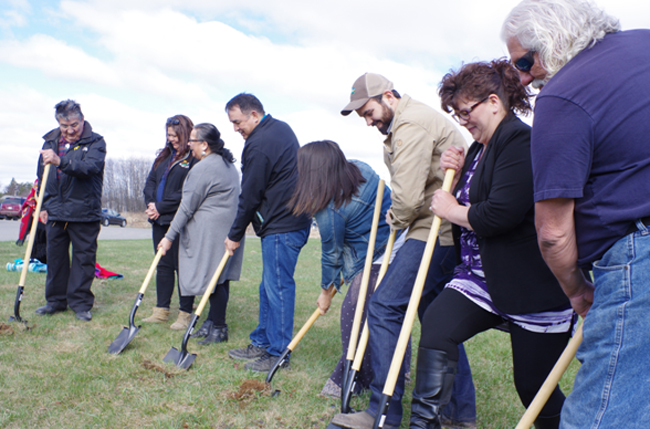Roots to Harvest partnership launched in Fort William

By Rick Garrick
Fort William launched an Ontario Works Community Garden in partnership with Roots to Harvest on May 4 to provide Ontario Works clients with gardening and other related skills.
“The rationale behind the community garden is to have community placements within our community that would allow our people to gain the skill and the confidence to gain meaningful and sustainable employment,” says Shannon Crews, manager of Fort William’s Ontario Works department. “It soon became apparent that the garden is not only about placements for our participants, it’s about getting back to our ways as Anishinabe. It’s about creating the good life — the Mino-Bimaadiziwin. It’s about taking action with life skills we need as Anishinabe to live effectively in the world and contribute to building quality of living and quality of community.”
The Gaa-Azhe-Anishinaabeyaayaang — Back to our Ways raised bed garden will be located next to the Social Services office at 300 Anemki Place.
“It will not only be an opportunity for our participants to gain skills, it will also be a gathering place for our community,” Crews says. “It’s about empowering our people to see the value in their work.”
Crews says the garden project will provide a not-for-profit community placement opportunity for Fort William community members.
“Right now I don’t have any not-for-profit except for Fort William First Nation in our community,” Crews says. “And the transportation barrier for Fort William is there. The (James Street swing) bridge is closed and city transportation is limited so to get them out of our community is quite a challenge.”
Stuart Oke, a community grower with Roots to Harvest, says planting is scheduled for late May and early June. Plans call for construction of a 265-foot by 40-foot garden, including raised bed vegetable production, an orchard, some berry production and some in-ground crops.
“We are going to be bringing in some soil amendments after soil testing,” Oke says. “We will be growing in raised boxes to ensure that fertility and the quality of soil is perfect for vegetable production.”
Plans call for the participants to be provided with the skills necessary to work in the garden and to harvest, cook and preserve the produce.
“Roots to Harvest is going to take on the initial stages,” Oke says. “Later on in the summer we will be working with members of the community to develop a routine and maintenance plan to keep the site looking beautiful and produce some real vegetables.”
Fort William Chief Peter Collins says the garden will provide community members on Ontario Works with new skills and inspiration to seek out new employment opportunities.
“It’s very important when you look at giving back some skills to our people and rebuilding our roots,” Collins says. “We survived on what we grew in the past and I think it is just about getting back to that way. And also instilling some values in the young people on Ontario Works so maybe to give them some hope and some inspiration to go out and look for new jobs and new placements.”
Don Bannon, a local contractor, plans to build a seven-foot wire fence around the garden to protect the produce from wildlife.
Rita Bannon, a member of the Animikki Wadjiw Ikwewuk – Fort William First Nation Women’s Hand Drum Group, says her parents used to plant potatoes in big mounds when she was growing up at Squaw Bay.
“We were shown how to dig the potatoes out whenever we needed the potatoes for a meal,” Fenton says. “It sustained us through the winter.”
Fenton says her family also used to to pick blueberries, raspberries, strawberries on the land.
“We picked the wild fruit from the land and then my mom would jar them and can them for the winter to keep us through the winter,” Fenton says. “So that is how we survived off the land through different plants and herbs.”
Leanne Angus, another member of the Animikki Wadjiw Ikwewuk, first began working on her grandfather’s garden when she was about six or seven years old.
“My grandfather always had a garden, so we had to weed it when we were little,” says Angus, who grows potatoes, corn, green peppers, tomatoes, onions, cucumber and radishes in her garden. “It’s good that we plant our own food. My garden is totally green; I don’t use any pesticides.”
Plans call for the garden project’s produce to be used in cooking programs and with the Ontario Works Food Bank to increase community food security.


